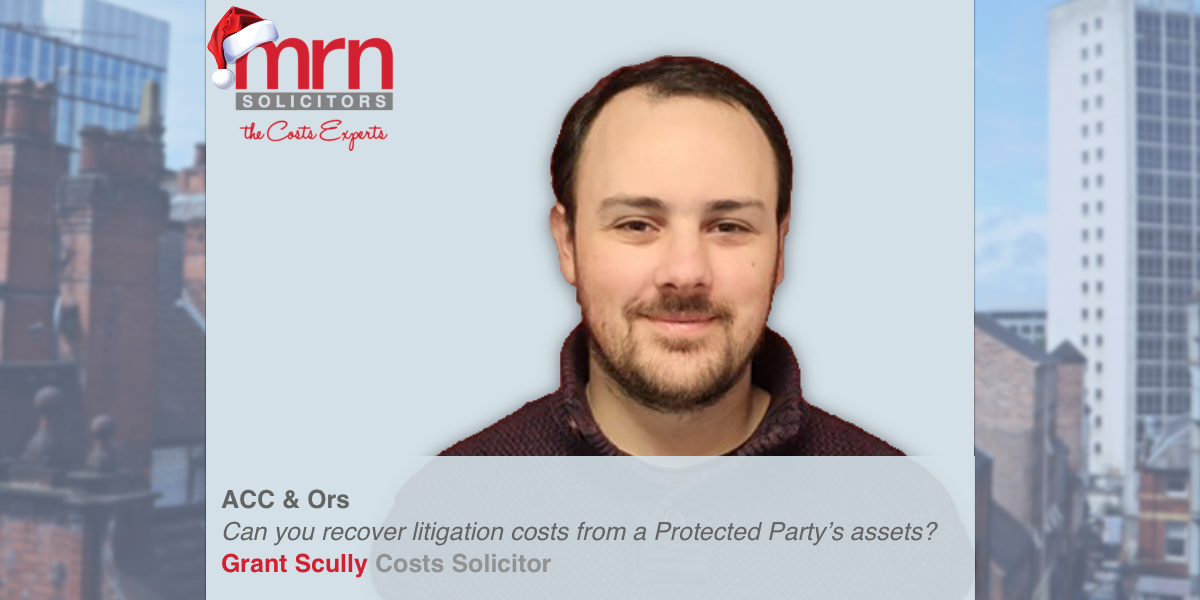ACC & Ors (property and affairs deputy; recovering assets costs for legal proceedings) [2020] EWCOP 9
It can be quite common for litigation to occur while a deputy is acting, or for a deputy to act before litigation has concluded. However, what happens when the solicitor conducting litigation tries to recover costs from the assets of the Protected Party?
Facts
These proceedings concerned three individuals whose connection was that each had a property and affairs deputy who was in some way part of the same firm of solicitors conducting the litigation. The common issue in each matter was whether, and in what circumstances, the deputy could recover from the protected person’s assets costs which had been or were likely to be incurred in legal proceedings.
Arguments
The Applicant deputies’ position was that a deputy had a “general” authorisation to manage a Protected Party’s property and affairs. This includes legal advice on contentious matters but falling short of conduct of litigation. The argument was that some pre-action work was recoverable. However, if there was an “urgent situation” then proceedings could be issued with the deputy seeking interim relief without specific prior authorisation from the Court of Protection.
The Official Solicitor who was acting on behalf of the protected parties (due to the conflict of interest with the Applicant deputies) contended that while advice on litigation could be sought, it was preferable for this to be done by a different firm and with prior authority from the Court. However, if the Deputy’s firm were to act, then special measures would need to be in place as it seemed easy for a conflict of interest to occur.
The Public Guardian, who joined the proceedings, took no position on the facts, but wished for the Court to set out the deputy’s powers as clearly as possible, and for any deputies to act in the best interest of their client, being free from conflict of interest.
Judgment
HHJ Hilder stated that the “general” authority to manage encompasses common tasks which are required to administer the protected party’s estate efficiently. The authority extended to non-contentious legal tasks, such as obtaining legal advice. To conduct litigation though specific authority was required unless it was in the Court of Protection for a property and affairs or welfare issue. If the deputy wished to instruct his own firm, then specific measures were required to address conflict of interest and specific authority was required to use the Protected Party’s funds.
- The deputy may seek prior authority
- The deputy is required to seek – in a manner which was proportionate to the magnitude of the costs involved and the importance of the issue to the protected party – three quotations from an appropriate provider (including one from his own firm), and determine where to give instructions in the best interest of the protected party
- The deputy must seek prior authority from the Court if the anticipated costs exceed £2,000.00 + VAT
- The deputy must clearly set out any legal fees incurred and account to the Public Guardian as well as appending the notes of the decision-making process
Our Conclusion
The Court will always put the protected party first. If a Deputy does wish to instruct their own firm, then all action must be taken to evidence that the Protected Party is protected. This must include obtaining appropriate quotes from prospective alternative suppliers. It is important to remember that a key element of the guidance given in this Judgment relates to evidence, there must be evidence in support of decisions made in the best interests of the protected party. The best way for this to happen would be to ensure that contemporaneous notes are prepared detailing decisions made.


